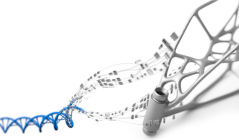Design-KIT: Artificial Intelligence in mechanical component development; TP: Deep Learning for geometry generation of mechanical components
| Working Group: | WG Industrial Mathematics |
| Leadership: | Prof. Dr. Dr. h.c. Peter Maaß ((0421) 218-63801, E-Mail: pmaass@math.uni-bremen.de ) |
| Processor: | Dr. Sören Dittmer |
| Funding: | DLR e.V. – Raumfahrtmanagement – Nationales Raumfahrtprogramm, Raumtransport |
| Project partner: |
Daniel Siegel, ELISE GmbH, Bremen Christian Knorr, ArianeGroup GmbH, Bremen |
| Time period: | 01.10.2020 - 31.03.2022 |
 The development of the Ariane 6 launch vehicle enables Europe to secure independent access to space and is aimed at significantly reducing production and launch costs. Due to a rapidly increasing number of competitors as well as private companies that have established themselves on the market, it is becoming increasingly difficult to prevail against the competition. It is therefore necessary to strengthen the economic and technical attractiveness of the European launchers and also to be able to make continuous adaptation and improvement cost-effective.
The mechanical design of the components plays an important role in the development and continuous improvement of space systems. In recent years, the disciplines of Deep Learning (DL), Computer-Aided Engineering (CAE) and 3D printing have developed into three of the most dynamic research fields worldwide. Almost simultaneously, these techniques are finding their way into industrial applications with sometimes astonishing success. In this project we therefore aim to increase the intersections of these three highly active, rapidly developing fields, to explore concrete solution concepts for problems of component development in space technology and subsequently to implement them in prototypes.
The core objective of the project is to be able to design interfaces that are as lightweight as possible in an automated way. The design of lightweight components requires a large number of hours of highly qualified personnel. Therefore, the increase of resource efficiency in all industrial sectors is desirable. In aerospace technology, however, this efficiency is particularly important: every kilogram of weight that can be saved on the component of an upper stage means one kilogram more payload.
The development of the Ariane 6 launch vehicle enables Europe to secure independent access to space and is aimed at significantly reducing production and launch costs. Due to a rapidly increasing number of competitors as well as private companies that have established themselves on the market, it is becoming increasingly difficult to prevail against the competition. It is therefore necessary to strengthen the economic and technical attractiveness of the European launchers and also to be able to make continuous adaptation and improvement cost-effective.
The mechanical design of the components plays an important role in the development and continuous improvement of space systems. In recent years, the disciplines of Deep Learning (DL), Computer-Aided Engineering (CAE) and 3D printing have developed into three of the most dynamic research fields worldwide. Almost simultaneously, these techniques are finding their way into industrial applications with sometimes astonishing success. In this project we therefore aim to increase the intersections of these three highly active, rapidly developing fields, to explore concrete solution concepts for problems of component development in space technology and subsequently to implement them in prototypes.
The core objective of the project is to be able to design interfaces that are as lightweight as possible in an automated way. The design of lightweight components requires a large number of hours of highly qualified personnel. Therefore, the increase of resource efficiency in all industrial sectors is desirable. In aerospace technology, however, this efficiency is particularly important: every kilogram of weight that can be saved on the component of an upper stage means one kilogram more payload.

